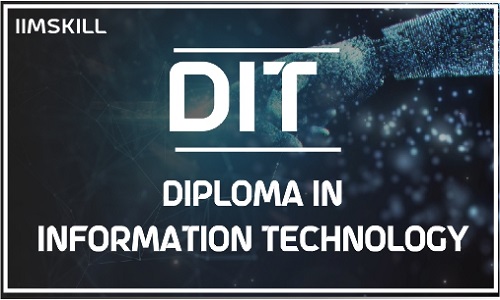
| Course Code : | IN246 | Duration : | 12 month |
| Course Type : | Standard | Eligibility : | 10 |
| Enquiry | |||
Diploma in Information Technology (DIT), the syllabus is usually condensed and focused on fundamental IT concepts and practical skills that are immediately applicable in the industry. This type of program is designed to equip students with essential IT knowledge and hands-on experience within a short period.
Diploma in Information Technology is also equilant to the "O"Level course.
### **1-Year Diploma in Information Technology Syllabus**
#### **Semester 1 (Fundamental IT Concepts)**
1. **Introduction to Information Technology**
- Overview of IT and its applications
- Computer fundamentals: hardware, software, and peripherals
- Basic understanding of operating systems (Windows, Linux)
- Introduction to digital literacy and IT ethics
2. **Basic Programming**
- Introduction to programming languages (C or Python)
- Data types, operators, and expressions
- Control structures: if-else, loops, and switch cases
- Functions, arrays, and basic data structures
- Simple problem-solving using programming
3. **Web Designing**
- HTML and CSS for web page creation
- Basics of JavaScript for interactive web elements
- Introduction to responsive web design
- Web page layout and design principles
- Creating and publishing simple websites
4. **Office Automation Tools**
- Word processing (e.g., Microsoft Word, Google Docs)
- Spreadsheets (e.g., Microsoft Excel, Google Sheets)
- Presentation tools (e.g., Microsoft PowerPoint)
- Database basics and introduction to Microsoft Access
- Internet usage and email communication
5. **Computer Networks Basics**
- Fundamentals of networking (LAN, WAN, MAN)
- OSI and TCP/IP models
- Networking devices: routers, switches, hubs
- Basics of IP addressing and subnetting
- Introduction to network security
6. **Database Management Systems (DBMS)**
- Introduction to databases and DBMS concepts
- SQL basics: data retrieval, manipulation, and management
- Database design and normalization
- Introduction to relational databases
- Simple database projects
#### **Semester 2 (Advanced IT Concepts and Applications)**
1. **Advanced Programming**
- Object-Oriented Programming concepts (OOP) (e.g., Java or C++)
- Classes, objects, inheritance, and polymorphism
- File handling and exception handling
- Introduction to GUI programming
- Developing small applications
2. **Software Engineering**
- Software development life cycle (SDLC)
- Requirement analysis and specification
- Introduction to software design methodologies
- Basics of software testing and quality assurance
- Project management and documentation
3. **Introduction to Web Technologies**
- Advanced HTML5 and CSS3
- Basics of JavaScript frameworks (e.g., jQuery)
- Introduction to server-side scripting (PHP or ASP.NET)
- Basics of web hosting and domain management
- Creating dynamic websites
4. **Introduction to Cybersecurity**
- Understanding cyber threats and vulnerabilities
- Basics of cryptography and encryption
- Network security fundamentals
- Best practices for securing systems and data
- Introduction to ethical hacking
5. **Cloud Computing Fundamentals**
- Introduction to cloud computing concepts
- Types of cloud services: IaaS, PaaS, SaaS
- Cloud deployment models (public, private, hybrid)
- Basics of virtualization and cloud infrastructure
- Overview of popular cloud service providers (e.g., AWS, Azure)
6. **Practical Lab Sessions**
- Hands-on practice in programming, web design, and database management
- Networking lab: setting up basic networks, configuring devices
- Project work: developing a simple IT solution, website, or application
7. **Project Work/Internship**
- A capstone project that integrates the knowledge and skills acquired during the course
- Real-world IT project: design, implementation, and testing
- Internship opportunities (if offered) to gain industry exposure
### **Key Focus Areas**
- **Practical Skills**: Emphasis on hands-on lab work and real-world projects to build practical IT skills.
- **Industry-Relevant Content**: Curriculum aligned with industry needs, preparing students for entry-level jobs or further studies.
- **Job Readiness**: Equips students with the knowledge and skills needed for roles such as junior programmer, IT support technician, web designer, and network administrator.
### **Career Opportunities After 1-Year Diploma in IT**
- **Junior Software Developer**
- **Web Developer**
- **IT Support Specialist**
- **Network Technician**
- **Database Administrator**
- **Cybersecurity Assistant**
This 1-year syllabus is designed to provide a well-rounded introduction to the field of Information Technology, with a focus on both theoretical knowledge and practical application.